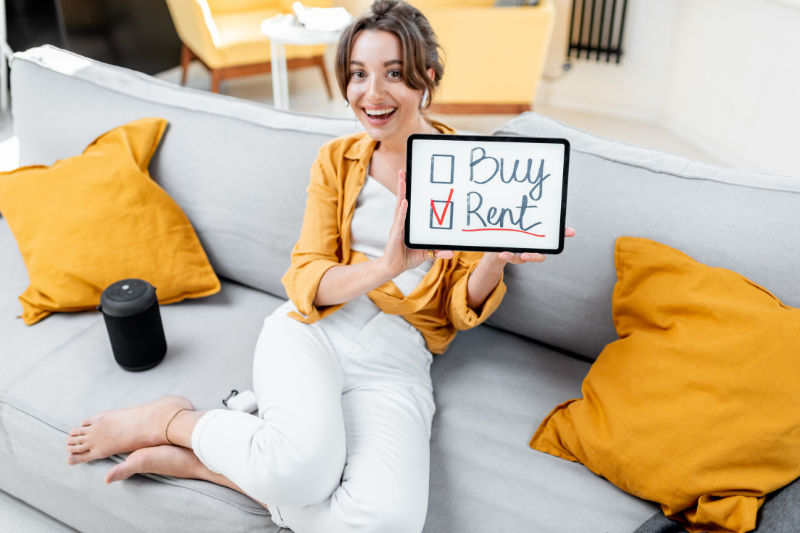In the midst of stimulus checks and rent payment controversies, a pretty easy question to find yourself asking is: should anyone really be renting at all?
The renting vs owning debate is not a new one at all and, unfortunately, there are no clear winners. The decision ultimately ends up being deeply personal and specific to your situation, your lifestyle, and your goals (or lack thereof) with property ownership. Nonetheless, there are a few things we can look at to shine a light on whether renting or buying is the right move for you.
The Case for Renting
The most direct and obvious case for renting is simply that buying a house is much more expensive than a lot of people can afford. Especially for a generation that’s dealing with more student debt than ever before, the idea of a home loan isn’t the most attractive thought, either.
There are reasons to prefer renting over buying other than simple necessity, however. Your lifestyle and career path are huge factors, for example. If you’re in a position that has you moving a lot, or that has you uncertain about where you’ll be living in the next 5 or 10 years, renting might definitely be a better option for you. Once your lease is up, you’re free to move on wherever and however you need, no strings attached. When paying off a house, however, you’ll likely be tied down for quite some time.

Another reason to prefer renting is that your monthly costs, as far as living space is concerned, is more or less set in stone. Rent increases are very real and worrying, but you won’t normally have to front the costs of repairs, renovations, or maintenance fees. While the issues might not be fixed as quickly as you’d like them to be, the owner is normally the one making the payments. When owning, these unexpected, sometimes “hidden” fees can come out of nowhere and very much throw off your monthly budget.
Finally, renting is a bit less of a gamble. While it’s true that buying is a strong path to increase your wealth via the asset that is your house, any actual accumulated wealth depends heavily on inflation, and your home actually increasing in value, something that is by no means guaranteed. While renting doesn’t directly put any money towards an investment and won’t grow your wealth on its own, it does allow you to put any money you save (compared to the more expensive payments from buying a home) into an investment portfolio. While increased wealth, in this case, is also dependent on external factors, your wealth isn’t tied up in a property that might lose value, and putting your money into investment at all is entirely optional.
The Case for Buying
It’s tough to decide that buying is the better option if you aren’t planning on sticking around for quite a while, but if you are thinking about living in the same place for a decade or two (or more, preferably), buying definitely has some pretty attractive benefits.
While buying can increase your wealth, it certainly isn’t inexpensive. Even in the long run, buying will be a much more expensive process than renting, in most cases, thanks to all of the homeownership fees that pop up on top of mortgage and the usual payments. Once you do pay off all of the ownership fees, however, you get the overwhelming relief that you don’t have to answer to anyone anymore (except, maybe, a homeowner’s association). Nobody is going to be bumping up your rent unexpectedly, and although unexpected fees now fall in your hands, the maintenance and repairs get done on your time, not whenever the apartment owner finds time to make an appointment.

With this and with most reasons to buy, the case being made is less financial and more emotional. There’s a feeling of pride that comes with owning a house, and a feeling of freedom that comes with not owing anybody another cent for rent. For long term living, a house becomes an integral and intimate part of your life, and a much more stable place to raise a family. It’s also a long-lasting asset that you’ll be able to pass on. Buying the house certainly won’t be cheaper than renting for you, but it might be a huge financial relief for whoever you pass it on to, if you choose to do so.
Which is Better for You?
Again, this is an incredibly personal question. Assuming you can afford to consider either option, perhaps the most important consideration is: how long are you planning on sticking around? If moving is regular or probable for you, buying makes changing cities a lot more expensive, while renting makes it hardly an inconvenience.
If you are sticking around, however, ask yourself how much owning your own place would really mean to you. If wealth accumulation is what matters to you, renting and investing the money that you save can often be a better option, especially if “sticking around” doesn’t mean staying 35+ years in an area that all but guarantees your home value to increase. If the pride and independence of ownership, and the security of passing on property are what you’re after, however, then buying might be a great option for you.
We hope you enjoyed our article about renting vs owning. Here are some other relevant posts you may also benefit from:


